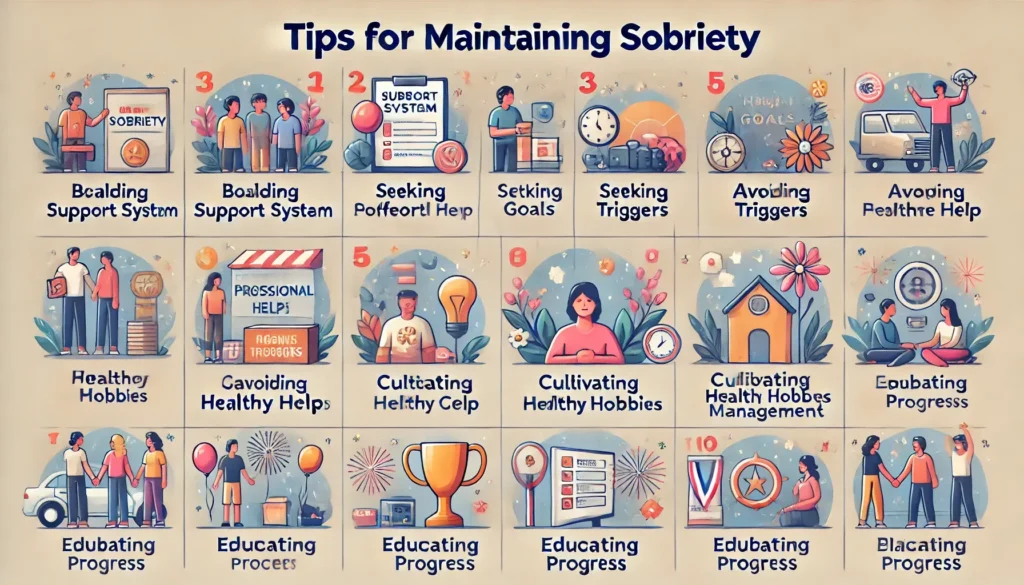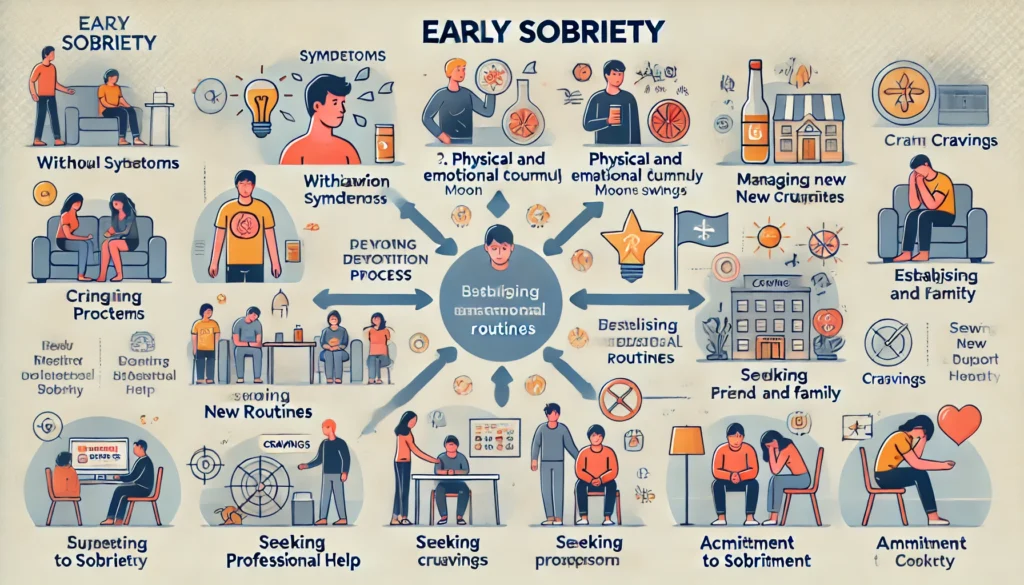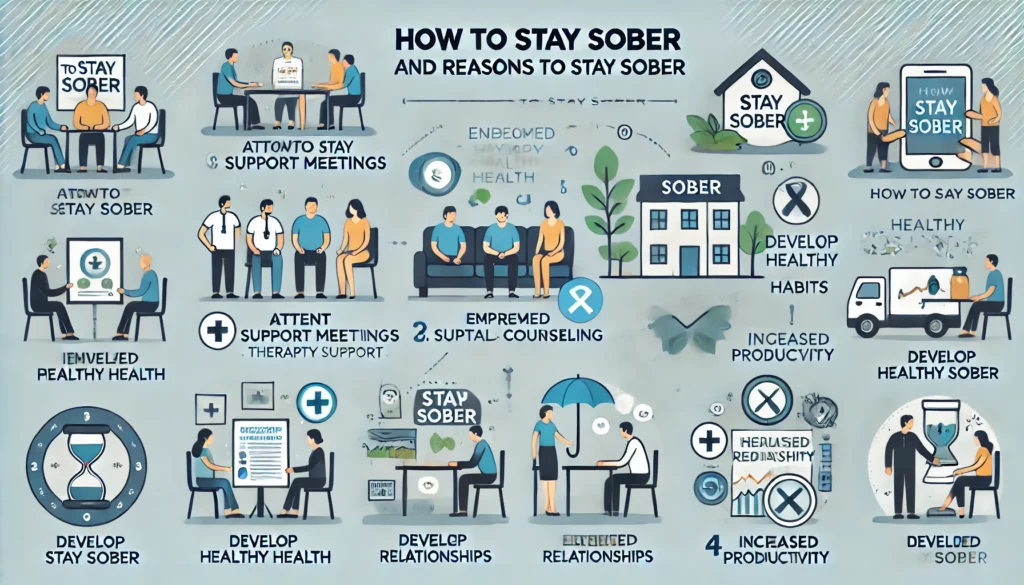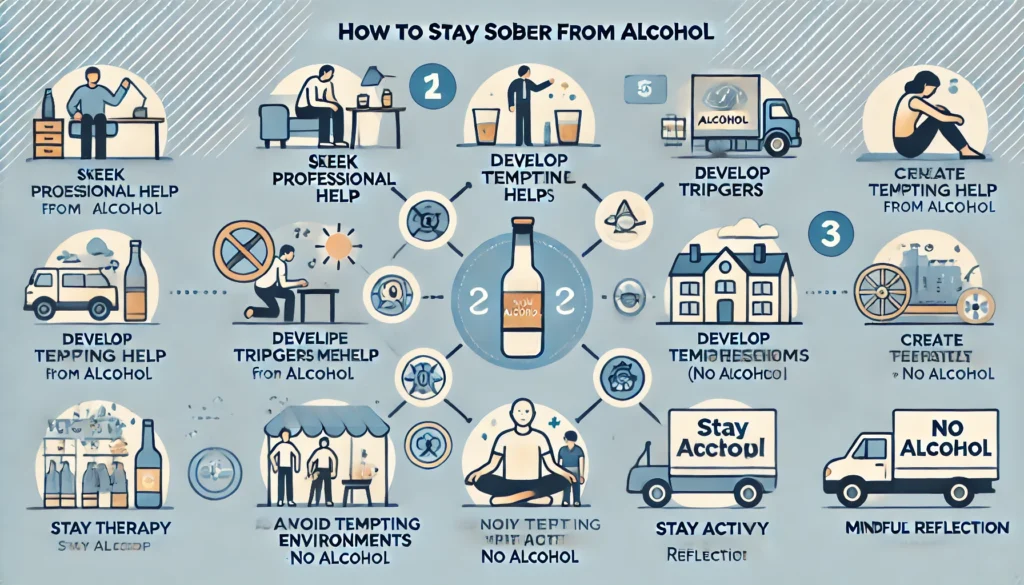Sobriety is a courageous step towards a healthier and more fulfilling life. However, staying sober is a continuous process that demands resilience, self-awareness, and a toolbox of effective strategies.
In general refers to the state of being sober, which means abstaining from the consumption of alcohol or, in a broader sense, avoiding the use of any mind-altering substances.
In this blog, we will explore a collection of invaluable tips designed to provide guidance and support for those navigating the challenges of maintaining sobriety.
A strong support system for developing coping mechanisms for stress and triggers, these tips are crafted to empower individuals on their unique paths to recovery.
What is sobriety? How to Maintain It?

Sobriety refers to the state of abstaining from the consumption of alcohol or any other addictive substances. It represents a commitment to a lifestyle that prioritizes mental and physical well-being by avoiding the negative impacts associated with substance abuse.
Maintaining sobriety involves adopting various strategies and practices to ensure a sustained, healthy lifestyle free from the influence of alcohol or drugs. Here are key steps to help individuals stay on the path of sobriety:
- Build a Support System:
Establish a network of friends, family, or support groups who understand and encourage your commitment reinforcement during a challenging time.
- Seek Professional Help:
Consult with healthcare professionals, therapists, or addiction counselors to receive personalized guidance. Professional support can address underlying issues and provide coping mechanisms crucial for maintaining sobriety.
- Set Realistic Goals:
Establish achievable short-term and long-term goals that align with your commitment to sobriety. Celebrate milestones and use them as motivation for continued progress.
- Avoid Triggers:
Identify and steer clear of situations, places, or people that may trigger cravings or temptations. Recognizing potential triggers helps create a protective environment conducive to maintaining sobriety.
- Practice Self-Care:
Prioritize self-care activities such as regular exercise, sufficient sleep, and a balanced diet. These practices contribute to overall well-being and help manage stress, a common factor leading to relapse.
- Cultivate Healthy Hobbies:
Engage in activities that bring joy and fulfillment. Cultivating new hobbies or rediscovering old passions can provide a positive focus and reduce the likelihood of turning to substances for comfort.
- Mindfulness and Stress Management:
Learn and practice mindfulness techniques to manage stress and anxiety. Mindful meditation, deep breathing exercises, and other relaxation methods can be powerful tools in maintaining sobriety.
- Educate Yourself:
Stay informed about addiction, recovery, and mental health. Understanding the nature of addiction and the benefits of sobriety can empower individuals to make informed decisions and stay committed to their goals.
- Celebrate Progress:
Acknowledge and celebrate personal achievements along the journey. Recognizing progress boosts confidence and reinforces the positive changes associated with a sober lifestyle.
- Plan for the Future:
Develop a long-term for maintaining sobriety, including strategies for handling potential challenges. Having a well-thought-out plan can provide a roadmap for navigating the complexities of life without relying on substances.
What is early Sobriety?

Early sobriety typically refers to the initial phase of recovery from addiction, specifically in the context of abstaining from alcohol or other substances.
This period is characterized by the early stages of adjusting to a life without the use of addictive substances, often immediately following detoxification or the decision to stop using.
During early sobriety, individuals may experience a range of physical, emotional, and psychological challenges as their bodies and minds adapt to the absence of the substances to which they were previously addicted. Common features of early sobriety include:
- Withdrawal Symptoms:
Many individuals entering early sobriety may face withdrawal symptoms as their bodies detoxify from the substances and the individual’s history of use.
- Physical and Emotional Turmoil:
The early stages of sobriety can be emotionally and physically challenging. Individuals may grapple with mood swings, irritability, anxiety, depression, and fatigue.
- Cravings:
Intense cravings for addictive substances are common during early sobriety. Managing these cravings and developing coping mechanisms to resist relapse is a crucial aspect of recovery.
- Establishing New Routines:
Early sobriety often involves creating new daily routines and habits that do not revolve around substance use. This can include finding alternative activities and social circles that support a sober lifestyle.
- Building a Support System:
Establishing a strong support system is vital during early sobriety. Whether through friends, family, support groups, or therapy, having a network of understanding and encouraging individuals can provide essential emotional support.
- Seeking Professional Help:
Many individuals in early sobriety benefit from professional guidance, whether through counseling, therapy, or participation in rehabilitation programs. Professionals can help address underlying issues and provide coping strategies.
- Acceptance and Commitment:
Accepting the reality of addiction, acknowledging the need for change, and making a commitment to sobriety are foundational steps during this early phase.
How to stay sober? Reasons to stay sober

Staying sober is a journey that requires commitment, self-awareness, and ongoing effort. Here are some key strategies and reasons to help individuals maintain their sobriety:
Strategies for Staying Sober:
- Attend Support Meetings:
Regular attendance at support meetings, such as Alcoholics Anonymous (AA) or Narcotics Anonymous (NA), can provide a sense of community, accountability, and guidance from individuals who share similar experiences.
- Therapy and Counseling:
Seek professional help through therapy or counseling. Addressing underlying issues and learning effective coping mechanisms can enhance resilience and contribute to long-term sobriety.
- Develop Healthy Habits:
Cultivate positive habits such as regular exercise, a balanced diet, and sufficient sleep. Engaging in healthy activities can contribute to overall well-being and help manage stress.
Reasons to Stay Sober:
- Improved Physical Health:
Sobriety contributes to better physical health, reducing the risk of various medical issues associated with substance abuse.
- Enhanced Mental Well-being:
Abstaining from substances can lead to improved mental health, increased clarity, and better emotional stability.
- Strengthened Relationships:
Sobriety fosters healthier relationships with family and friends, as communication and trust are restored.
- Increased Productivity:
Being sober allows individuals to focus on personal and professional goals, leading to increased productivity and success.
How to help someone stay sober?
Supporting someone in their journey to stay sober can be challenging but also incredibly rewarding. Here are some suggestions to help someone stay sober:
- Encourage Professional Help:
Encourage the individual to seek professional help from a therapist, counselor, or addiction specialist. Professional guidance can be crucial in addressing underlying issues and developing coping strategies.
- Educate Yourself:
Learn about addiction, the recovery process, and the challenges individuals face. Understanding the nature of addiction can help you provide better support.
- Create a Sober Environment:
Help create a supportive and sober environment. Remove or limit access to substances, and avoid places or situations that may trigger cravings or relapse.
- Establish Open Communication:
Foster open and honest communication. Encourage the person to share their thoughts and feelings without fear of judgment. Active listening can go a long way in providing emotional support.
- Set Realistic Expectations:
Understand that recovery is a process, and setbacks may occur. Set realistic expectations and encourage during difficult times.
- Encourage Healthy Habits:
Promote healthy lifestyle choices, including regular exercise, a balanced diet, and sufficient sleep. These habits contribute to overall well-being and can support the recovery process.
- Offer Practical Help:
Assist with practical aspects of life, such as helping with daily tasks, transportation, or finding employment. Reducing stressors can contribute to a stale and supportive environment.
- Participate in Family Therapy:
If appropriate, consider attending family therapy sessions. Family support can play a significant role in the recovery process.
- Encourage Hobbies and Activities:
Help the person find and engage in positive hobbies and activities that promote a sense of purpose and fulfillment.
- Know Emergency Procedures:
Familiarize yourself with emergency procedures in case of a crisis, and encourage the person to have a support network they can reach out to during challenging times.
How to stay sober from alcohol?

Staying sober from alcohol is a commendable and challenging journey that requires commitment and effort.
Here are some strategies that may help:
- Seek Professional Help:
Consult with a healthcare professional, therapist, or counselor who specializes in addiction. They can provide guidance, support, and personalized strategies for staying sober.
- Identify Triggers:
Recognize and understand the situations, emotions, or people that trigger the desire to drink. Develop coping strategies to navigate these triggers without turning to alcohol.
- Develop Coping Mechanisms:
Learn healthy ways to cope with stress, anxiety, and other emotions. This could include mindfulness, meditation, exercise, or engaging in hobbies and activities you enjoy.
- Avoid Tempting Environments:
Stay away from places, events, or people that may tempt you to drink. Create a sober environment that supports your commitment to staying alcohol-free.
- Create a Structured Routine:
Establish a daily routine that includes regular sleep, meals, and activities. A structured routine can provide stability and reduce the likelihood of boredom or impulsive behaviors.
- Stay Active:
Regular physical activity can contribute to both physical and mental well-being. Exercise can be a positive outlet for stress and a way to maintain a healthy lifestyle.
- Consider Therapy:
Individual or group therapy can provide a safe space to explore underlying issues contributing to alcohol use. Therapists can also help you develop effective coping mechanisms.
- Mindful Reflection:
Take time to reflect on your journey, the reasons for staying sober, and the positive changes you’ve experienced. Regular self-reflection can reinforce your commitment.
How to get sober on your own?
Getting sober on your own can be challenging, and it’s important to recognize that seeking professional help and support is often beneficial. However, if you’re determined to pursue sobriety independently, here are some strategies you can consider:
- Acknowledge the Problem:
Be honest with yourself about the extent of your alcohol use and its impact on your life. Acknowledging the issue is the first step towards recovery.
- Set Clear Goals:
Define your reasons for wanting to get sober and set clear, achievable goals. Having a strong sense of purpose can help motivate you during challenging times.
- Create a Plan:
Develop a detailed plan outlining how you will achieve and maintain sobriety. Consider including coping strategies, alternative activities, and a support network.
- Remove Temptations:
Clear your living space of alcohol and avoid places or situations where you might be tempted to drink. Create an environment that supports your commitment to sobriety.
- Stay Busy:
Fill your time with activities that bring you joy and fulfillment. This can help prevent boredom, a common trigger for relapse.
- Set Boundaries:
Establish clear boundaries with friends or acquaintances who may encourage or enable your drinking. Communicate your decision to get sober and request their support.
- Seek Online Resources:
Explore online forums, support groups, or resources that provide information and connect you with individuals who are also pursuing sobriety.
- Track Your Progress:
Keep a journal or use a sobriety-tracking app to monitor your progress. Celebrate your achievements, no matter how small, and reflect on the positive changes you’re experiencing.
- Practice Self-Care:
Prioritize self-care activities that contribute to your overall well-being, such as proper nutrition, regular exercise, and sufficient sleep.
- Consider Professional Help:
While you may be attempting to get sober on your own, seeking professional help, such as counseling or therapy, can provide valuable support and guidance.
How to get sober at home?
Getting sober at home is a commendable goal, but it’s essential to approach it with a realistic and thoughtful plan. While self-guided efforts can be effective for some individuals, it’s crucial to recognize the potential challenges and risks associated with attempting to get sober without professional support. Here are some steps you can consider if you’re planning to pursue sobriety at home:
- Develop a Sobriety Plan:
Create a detailed plan outlining how you will achieve and maintain sobriety. Consider factors such as coping strategies, alternative activities, and a support network. Having a plan in place can provide structure and guidance.
- Create a Support System:
Share your goals with friends or family members who can offer support and encouragement. Having a reliable support system is crucial during the recovery process.
- Establish a Daily Routine:
Create a structured daily routine that includes regular sleep, meals, and activities. A routine can provide stability and help prevent boredom or impulsivity.
- Monitor Progress:
Keep track of your progress using a journal or a sobriety-tracking app. Celebrate your achievements, no matter how small, and reflect on positive changes.
- Practice Self-Care:
Prioritize self-care activities, such as proper nutrition, regular exercise, and sufficient sleep. Taking care of your overall well-being is essential during the recovery process.
Final Thoughts
In the journey of early recovery, remember that each day is a gift, a testament to your strength. A journey of strength, resilience, and spiritual uplift. Surround yourself with support, let courage be your guide.
Embrace the support around you, build a network that understands the challenges, and be patient with yourself. Prioritize self-care, nurture positive habits, and celebrate small victories. Recognize that setbacks are part of the process, not the end. Stay committed to your well-being, and let gratitude guide you.







